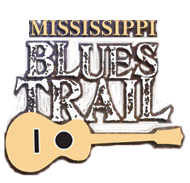Sonny Boy Williamson
Sonny Boy Williamson - Glendora
Sonny Boy Williamson (c. 1912-1965), one of the premier artists in blues history, was born on a Glendora plantation under the name Alex Miller. A colorful character and charismatic performer, he was widely known as “Rice” Miller or “Sonny Boy No. 2″—in deference to another bluesman who had recorded earlier as “Sonny Boy” Williamson. Miller’s mastery of the blues idiom resonated through all phases of his work as a singer, songwriter, and harmonica player.
Sonny Boy Williamson was perhaps the greatest harmonica player ever born in the Mississippi Delta and one of the most remarkable and poetic blues composers as well. He left an impressive musical legacy through his recordings of “Eyesight to the Blind,” “Help Me,” “Your Funeral and My Trial,” “Fattening Frogs for Snakes,” “Nine Below Zero,” “Mighty Long Time,” “Unseeing Eye,” and many others made for Trumpet Records in Jackson (1951-1954) and the Chess/Checker company in Chicago (1957-1964). He was also the first star of blues radio broadcasting in the South, famed for his live performances on the influential King Biscuit Time radio show out of Helena, Arkansas, which began in 1941.
Williamson’s estimated birthdate of December 5, 1912, is based on census data and recollections of his sisters. The inscription on his gravestone reads “Aleck Miller, Better Known as Willie ‘Sonny Boy’ Williamson, Born Mar. 11, 1908.” A trickster who was often in trouble with the law, he also confounded authorities and interviewers by using various other names and birthdates. Williamson songs such as “Don’t Start Me Talkin’” and “Keep It To Yourself” reflected his guarded, suspicious nature, which may well have been influenced by a harsh childhood environment. He was born on a plantation owned by Selwyn Jones, who was called to task by Mississippi Governor Earl Brewer for mistreatment of African Americans in 1915; in earlier years at least a dozen lynchings had been reported in Tallahatchie County, including several in Glendora.
During his career, Williamson teamed with such legendary artists as Robert Johnson, Elmore James, Robert Lockwood, Jr., Muddy Waters, and Buddy Guy. In the 1960s he became somewhat of a celebrity in England, performing and recording with a young Eric Clapton and the Yardbirds, the Animals, and others. In 1965 Williamson made his way back to Glendora and stayed a few weeks with his cousin, Willie James Stewart. He performed at Stewart’s juke joint, the King Place, which stood at this site, according to Glendora mayor Johnny B. Thomas, also a cousin, who worked for Stewart. Williamson eventually returned to Helena, where he resumed playing on King Biscuit Time, and reportedly told his guitarist, Houston Stackhouse, that he had come home to die.
Stackhouse drove Sonny Boy back to Mississippi a few times so he could revisit the places of his youth and see friends and family one final time. After Williamson died in Helena on May 25, 1965, several tributes to him were recorded by artists in both the United States and England. He was elected to the Blues Hall of Fame in the first year of balloting, 1980. He is buried in Tutwiler.
content © Mississippi Blues Commission
[ BACK TO TOP ]

